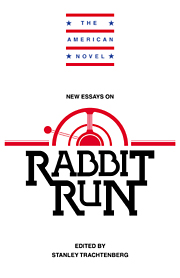Book contents
- Frontmatter
- Contents
- Series Editor's Preface
- 1 Introduction
- 2 The Full Range of Updike's Prose
- 3 Restlessness in the 1950s: What Made Rabbit Run?
- 4 The Americanness of Rabbit, Run: A Transatlantic View
- 5 “Unadorned Woman, Beauty's Home Image”: Updike's Rabbit, Run
- Notes on Contributors
- Selected Bibliography
3 - Restlessness in the 1950s: What Made Rabbit Run?
Published online by Cambridge University Press: 05 June 2012
- Frontmatter
- Contents
- Series Editor's Preface
- 1 Introduction
- 2 The Full Range of Updike's Prose
- 3 Restlessness in the 1950s: What Made Rabbit Run?
- 4 The Americanness of Rabbit, Run: A Transatlantic View
- 5 “Unadorned Woman, Beauty's Home Image”: Updike's Rabbit, Run
- Notes on Contributors
- Selected Bibliography
Summary
These are the tranquilized Fifties.
–Robert Lowell, Life StudiesMuch of Robert Lowell's “Memories of West Street and Lepke” is unabashedly personal, a ruthless raiding of private experience that overturns formalistic assumptions about aesthetic distance and replaces them with a plainspoken “I,” clearly and undeniably the voice of the poet himself. Other dark, latter-day Romantics such as Sylvia Plath, Anne Sexton, and W. D. Snodgrass soon followed in a bursting forth of what came to be known as “confessional poetry,” but it was Lowell's Life Studies (1959) that made the new candor possible. No longer was poetry, as in T. S. Eliot's formulation, “an escape from personality,” but rather a wallowing in the private, often humiliating, details of one's private life – without the knotty, metaphysical language that characterized Lowell's earlier poetry (for example, “The Quaker Graveyard in Nantucket”) and certainly without the obligation to speak the unspeakable through a dramatic mask.
I begin with Lowell's characterization of the fifties as a way to test out just how anxious, how jumpy, the age of conformity actually was; and how much rebelliousness the decade generated. Later, I'll suggest the ways in which Rabbit, Run – published in the same year as Life Studies – employs formalist techniques (the very ones Lowell abandoned) to give this ambivalent decade an objective correlative and a human face. That said, I start with the obvious: The “tranquilized Fifties” is one of those phrases that rings with authority and sticking power.
- Type
- Chapter
- Information
- New Essays on Rabbit Run , pp. 53 - 76Publisher: Cambridge University PressPrint publication year: 1993
- 1
- Cited by



